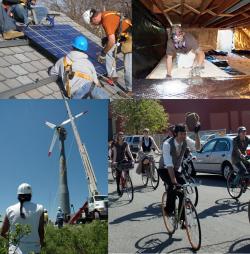From a science education perspective, one major thing that can be done about climate change is to support education efforts that help individuals and societies make informed decisions about climate change. Climate science must be integrated as practical knowledge into society so that understanding the complex physical and biological interconnections are relevant to decision-making in social, economic, political, cultural, and educational systems. While information alone is not enough to prepare society for the immediate and long-term challenges of human influences on climate, without a scientifically informed understanding of the causes and effects of climate change, it will be difficult or impossible to reduce vulnerabilities or enhance the resilience of communities and ecosystems affected by climate change.

The two most important strategies for addressing climate change are mitigation and adaptation. The two strategies are related and overlap to a degree, but the basic distinction is that mitigation means limiting the amount of climate change which occurs, primarily by reducing greenhouse gas concentrations, while adaptation means changing the way we as a society live in response to the changing climate.
Mitigation to reduce greenhouse gas emissions entails the reduction and conservation of oil, gas, and coal, the fossil fuels that are used in transportation, heating and cooling, agriculture, and electricity generation. Replacing carbon-intensive fuels with renewable and alternative energy sources is key to “decarbonizing” the current energy infrastructure, which will require transforming the global economy that is currently fueled primarily by carbon-based energy sources. In order for mitigation to be successful, it is necessary to understand how humans currently consume energy and how that impacts the climate, and then make appropriate decisions to minimize that impact. There are already a number of energy sources which produce electricity at costs comparable to coal and natural gas, and improving the efficiency and availability of those technologies is a major area of research. Many private homeowners and schools generate their own electricity with solar panels or wind turbines, showing students and their neighbors that these technologies are available and affordable. Simple measures to increase household energy efficiency, to drive less by biking, carpooling, and riding public transit, and to ship our food shorter distances all play important roles in averting future climate change.
Changing our own behavior can limit climate change: By switching to energy sources that don't release greenhouse gases, increasing the energy efficiency of our homes and offices, and driving less, we can reduce our effect on the climate and limit climate change.
Adapting to climate change is also crucial since, no matter how successful mitigation efforts are, the changes already occurring are predicted to increase in the years and decades to come, requiring serious planning to minimize risks, vulnerabilities, and impacts. Adaptation strategies that communities are already implementing include:
- Building sea walls and moving away from vulnerable coasts in order to avoid sea level rise and storm surges
- Diversifying crops and using drip irrigation for agriculture
- Building new public works such as sewers, bridges and aqueducts to handle changes in rainfall and flooding
- Training public health professionals for increased health impacts and emerging diseases
- Developing wildlife conservation plans and new migration corridors to protect endangered species
- Designing buildings to conserve and even generate energy, and
- Demonstrating strategies and lifestyles for increased sustainability and resilience
Because there is a lag between increased greenhouse gas emissions and increased warming, even if all greenhouse gas emissions stopped today, it would take decades before temperatures, rainfall, and other effects of human-caused climate change would begin to abate. So adaptation and mitigation will inevitably proceed in parallel.
Climate change will affect every part of society. The response to climate change — through mitigation and adaptation — has to involve individuals and families at home, students and educators in schools, leaders and workers in organizations, and local, state, national and international governmental bodies. The actions we take and decisions we make can create opportunities or limit the options for the next generation. Ideally, by reducing the effects and adapting to climate change, the present generation will improve its own condition, with benefits such as a higher quality of life and public health, while helping future generations through its foresight and planning.
Further reading:
- Climate Change 2007: Impacts, Adaptation, and Vulnerability and Climate Change 2007: Mitigation, two major reports from the Intergovernmental Panel on Climate Change, an international organization that periodically brings together scientists to evaluate the state of climate science, reviewing the evidence of how climate change in affecting society and the natural world. The Summary for Policymakers on adaptation (PDF) and the Summary for Policymakers on mitigation are especially accessible.
- Adaptation Planning: What US States and Localities are Doing, a 2009 report from the Pew Center for Climate and Energy Solutions, describing how states and cities in the United States are adapting to climate change
- Climate 101: Adaptation (PDF) is a brief summary of what climate adaptation is and how various parts of the US are already adapting to climate change
- There are multiple citizen science projects that let individuals and groups help track climate change, such as Project Budburst, the National Phenology Network, Climateprediction.net, and OldWeather. You can learn more about citizen science and find more projects related to climate change at Scistarter and the Citizen Science Central climate change portal.
- The Climate and Energy Awareness Network provides online educational resources and exercises exploring how humans can mitigate and adapt to climate change.
